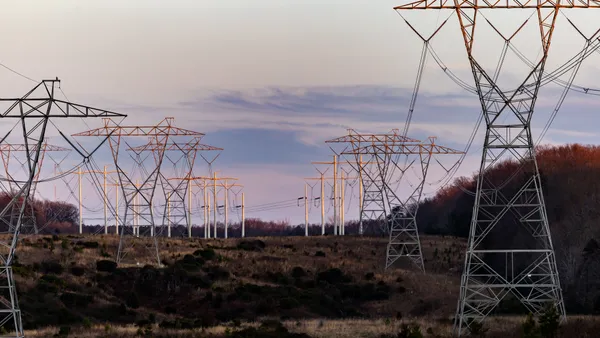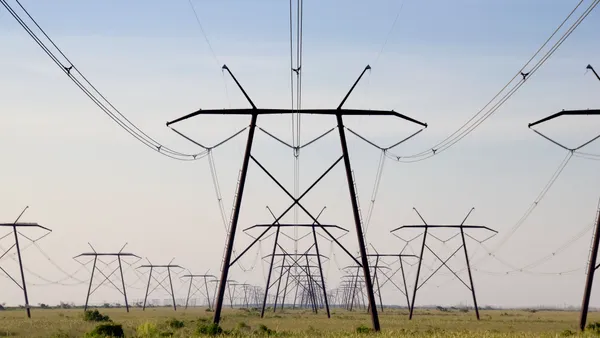Dive Brief:
- The Federal Energy Regulatory Commission on Friday halted the construction of one major natural gas pipeline and declined to revisit decisions approving three others in the final hours before Republicans lost their one-vote majority at the agency.
- FERC voted 3-2 to deny rehearing on the PennEast Pipeline, Eastern Market Access Project and the Southeast Markets Pipeline Project, allowing work to move forward. FERC also unanimously ordered a stop to construction of the Atlantic Coast Pipeline, saying a court ruling last week could mean it will need to be rerouted.
- The flurry of activity came on the last day at work for Republican Commissioner Robert Powelson, who retired early to head a water company trade group. The resulting 2-2 partisan split on the commission allows Democrats to deadlock votes until a replacement is confirmed.
Dive Insight:
FERC’s latest pipeline orders highlight the commission's partisan divide over how it should consider the climate change impacts of new projects — an issue that could stall approvals now that Powelson has stepped down.
Regulators late Friday declined to revisit decisions approving three pipeline projects — the 116-mile PennEast pipeline in Pennsylvania, the Eastern Market pipeline upgrade in Maryland, and the three projects that make up the Southeast Markets application, including the 515-mile Sabal Trail pipeline.
They also approved the Transcontinental Pipeline expansion, a 10-mile uprating project in New Jersey, and denied rehearing on the Atlantic Coast Pipeline before stopping its construction in a separate letter to developers.
In each case, Democratic commissioners issued separate statements challenging the majority’s interpretation of climate risks. Commissioners Cheryl LaFleur and Richard Glick dissented on each order, except for the Transco project, where LaFleur issued a concurrence.
The Southeast Markets decision in particular is significant in the climate debate. Last August, the D.C. Circuit Court ordered FERC to expand its consideration of greenhouse gas impacts in response to a challenge filed by environmental groups against the project, which would transport gas from Alabama to Florida.
In the past, FERC had only considered the direct GHG impacts of pipeline construction, but the three-judge panel ordered it to also take into account a pipeline's potential influence on the production and consumption of natural gas.
FERC's Republican majority responded by nominally accounting for expanded GHG impacts in future decisions, but arguing such measurements are too imprecise to be significant. The Friday orders reflect those arguments, with the majority declining to engage in a quantified analysis of climate risks.
"The fact that [FERC] … was unable to determine whether the quantified GHG emissions were significant, does not vitiate the fact that we analyzed them and concluded that the identified quantity of GHG emissions does not support a finding that the [Southeast Markets] Project is environmentally unacceptable," they wrote.
Democrats and environmental groups argue the commission has tools at its disposal to quantify the climate impacts of pipeline building, like the Social Cost of Carbon metric developed by an interagency working group during the Obama administration.
The majority, however, wrote Friday that the SCC "results in misleading analysis devoid of context," and refused to consider it in the ruling.
The pipeline orders are likely to be challenged in court. Both Democrats wrote that FERC's refusal to quantify GHG impacts violates its project review responsibilities under the National Environmental Policy Act (NEPA), giving green groups a potential framework to contest the decision.
"Today's order provides no explanation as to why these economic measures of a project's benefits can be considered without the context of the project’s costs, but to do the opposite would be ‘misleading,’” Glick wrote. “The failure to explain that inconsistency is arbitrary and capricious.”
Atlantic Coast halted, rehearing denied
All of FERC's pipeline orders Friday included dissents, but the commission spoke with one voice in its letter to halt the Atlantic Coast Pipeline.
Last week, the Fourth Circuit Court threw out construction certificates for the 600-mile pipeline from West Virginia to North Carolina, writing it was based on a faulty right-of-way permit awarded by the National Park Service for where the pipeline would cross the Blue Ridge Parkway, a road in Virginia that is part of the National Park system.
That decision may mean the pipeline will have to be rerouted, so the commission stopped work on the entire project to prevent unneeded environmental damage. FERC did the same for the Mountain Valley Pipeline earlier in the month when the same court invalidated its permits.
FERC gave pipeline developers five days to file an interim work plan and three days to file applications to allow sections of the pipeline not affected by the court ruling to return to service. Dominion Energy, which is building the pipeline, said last week it would push for a speedy resolution to the siting issue.
In a separate order, FERC denied rehearing on the underlying construction permits for Atlantic Coast awarded last October. Chairman Kevin McIntyre recused himself from the rehearing decision because he represented parties in the proceeding as a private practice lawyer, as Commissioner Glick on a voluntary basis.
In a separate statement, Glick explained that he would have voted to grant rehearing on the controversial project, but stood aside because a 2-2 vote would invalidate an appellate court challenge against the pipeline.
"If I had voted, the rehearing order would have failed on a 2-2 vote ... and pursuant to the requirements of section 19 of the Natural Gas [Act], the appellate courts would not have had jurisdiction to review the Commission's decision to grant the Certificate," he wrote.
Additionally, Glick wrote that he did not see an opportunity to vote on the rehearing order after Powelson left, "leaving only three commissioners to participate in this proceeding for the foreseeable future."
The situation points to the need for lawmakers to amend the FPA and NGA "to account for the ability of an aggrieved party to seek redress in the courts of appeal," Glick wrote.
The vote also highlights the impacts of Powelson's departure and the new potential for deadlocked FERC votes. Last week, Politico reported the White House is considering Department of Energy official Bernard McNamee for the post, but his stage in the vetting process remains unclear and confirmation by the Senate could take months, meaning FERC will likely have to deal with a vacancy for the rest of the year.













